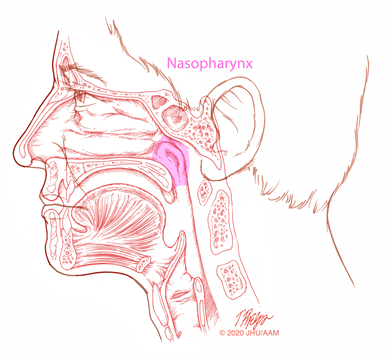


Nasopharyngeal carcinoma (also known as NPC) is a rare tumor of the head and neck which originates in the nasopharynx. The nasopharynx is located at the very back of the nose near the Eustachian tubes (Figure). Nasopharyngeal carcinoma is more common in Southeast Asia and is frequently, but not always, caused by Epstein-Barr virus (EBV).


Our head and neck surgeons and speech-language pathologists take a proactive approach to cancer treatment. Meet the Johns Hopkins specialists who will work closely with you during your journey.
Nasopharyngeal carcinoma is diagnosed by biopsy of the tumor, which is often performed in clinic with a use of a small endoscope. This allows the head and neck surgeon to visualize the tumor and its extent. Imaging techniques (MRI and/or CT scan) may also help determine the extent of the tumor. Testing of the tumor for EBV is also recommended.
Primary nasopharyngeal carcinoma (initial diagnosis) typically responds well to radiation therapy. Depending on the size and extent of the tumor, chemotherapy may be combined with radiation therapy.
Recurrent nasopharyngeal carcinoma (cancer that comes back after treatment), if manageable by surgical removal, can be removed either with an endoscope and endoscopic instruments through the nostrils or by an open surgical approach if necessary.
Sometimes radiation therapy, proton beam therapy, or chemotherapy are incorporated into the treatment of recurrent nasopharyngeal carcinoma. The use of immunotherapy for recurrent nasopharyngeal carcinoma patients is an active area of clinical research.

Our team offers comprehensive treatments for cancers affecting the nasal passages, sinuses, the throat and nearby areas. Our head and neck surgeons work closely with medical and radiation oncologists, endocrinologists and other specialists to provide well-rounded care.